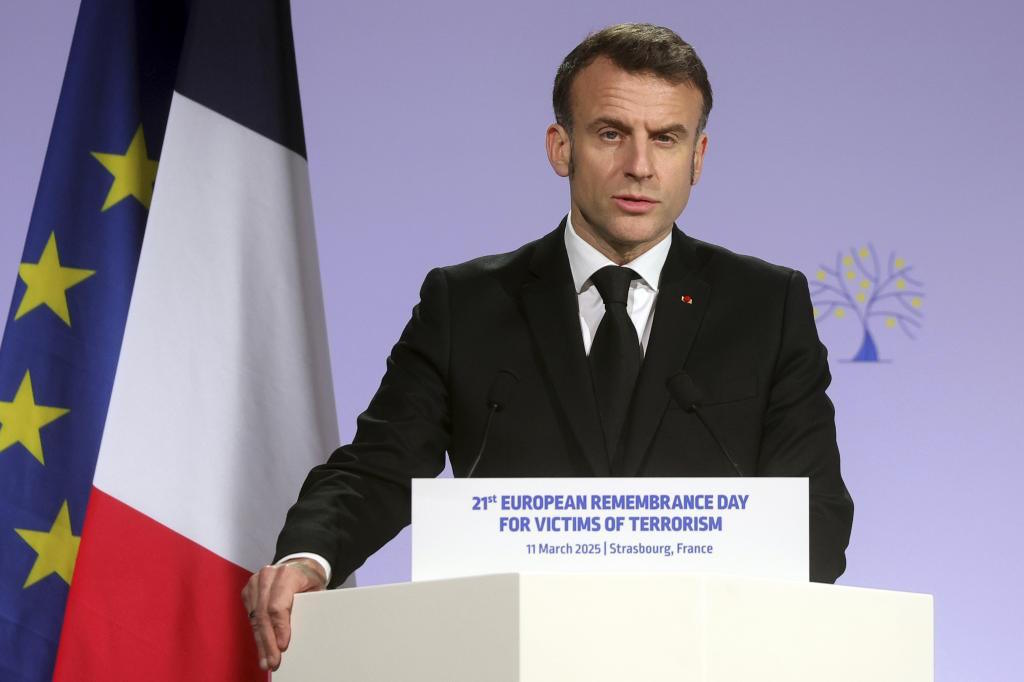Emmanuel Macron met on Wednesday in Paris with 30 Chiefs of Staff from EU and NATO countries to discuss "the necessary rearmament of Europe," according to sources from the French Ministry of Defense. The military meeting, attended by Admiral General Teodoro López Calderón representing Spain, will also examine the deployment of a hypothetical peace mission in Ukraine with countries willing to send troops.
The meeting is part of the so-called Paris Forum on Defense and Strategy planned some time ago. However, the French President decided to give the meeting the highest level when he announced, in his speech to the nation last week, his meeting with the European military leadership to orchestrate the continent's response to "the Russian threat."
Defense Minister Margarita Robles warned that the presence of Spain's high military command at the meeting does not imply "at all" that our country will change its position on the possible deployment of troops to Ukraine. "It is a complex decision that will always be evaluated in the context of the unity of EU countries," Robles stated.
The Defense Ministers of the five largest armies in Europe (France, UK, Germany, Poland, and Italy) will also meet on Wednesday in Paris to discuss the possible deployment of a peace mission to Ukraine. The "premier" Keir Starmer, one of the "godfathers" of the idea, also plans to hold a virtual meeting of European leaders on Saturday to shape the so-called Coalition of the Willing.
According to British estimates, about twenty countries have so far shown signs of wanting to join the hypothetical coalition; among them, Sweden, Belgium, Denmark, and even Australia. Poland and Italy have initially opposed the idea of sending troops to Ukraine, as have Slovakia and Hungary (the only country out of the 27 that did not sign the EU statement calling for "robust and credible security guarantees" for Ukraine in a potential peace agreement).
"Europeans are far from reaching a force of 200,000 soldiers (the amount requested by Zelenski) and remain deeply divided on this issue," warned Philippe Migault, director of the European Center for Strategic Analysis (CEAS), to Euractiv. "As for the French army, it would only be able to mobilize a few thousand soldiers, just like the UK."
"It is difficult to envision a force larger than 40,000 soldiers," warns Elie Tenenbaum, security analyst at the French Institute of International Relations, emphasizing the vast expanse of the front of over a thousand kilometers in eastern Ukraine. This could translate into a few brigades stationed east of the Dnipro River. Alternatively, an air contingent that enforces a "no-fly zone" over cities and energy infrastructure.
"Operationally, Europeans would be able to deploy troops in Ukraine, despite significant logistical constraints," adds Tenenbaum, who also warns of the risks of a supposed peace mission: "If the Russians were to attack European forces in Ukraine, how would Washington respond?"
Russian Foreign Minister Sergey Lavrov has warned, in any case, that the presence of NATO troops on Ukrainian soil is "clearly unacceptable" in the case of a peace agreement and would be interpreted as NATO's entry into the conflict.
Beyond the hypothetical peace mission, Emmanuel Macron used his meeting with the military leadership to explore options for "European rearmament," a week after his call to French patriotism in the face of the "Russian threat" that triggered a war of words with Putin and comparisons to Napoleon.
As a counterpoint to his diminished image in France, Macron is currently playing the role of a virtual commander-in-chief of a hypothetical European army, an idea he himself proposed eight years ago. His proposal to extend the French nuclear umbrella to European allies was also on the table in his meeting with European generals.
